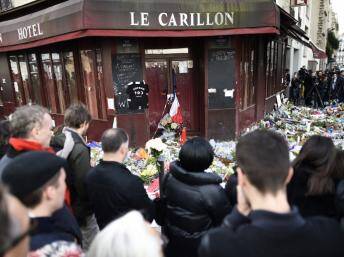Man is a maker of meaning. Unlike other creatures on earth, humankind infuses the physical world with significance. Animals rub against each other, but only humans embrace, kiss or, to evoke an act that we infuse, hopefully, with great meaning “make love.” Animals produce noises, some of them beautiful, but only humans truly sing, which is to imbue sound with worlds of meaning. All animals feed, but we alone give thanks at a meal, or celebrate freedom in a Passover Seder, or call Christ present among us in the celebration of the Eucharist.
Likewise, nature can be violent, even cruel in our eyes, but only humans perpetrate evil under twisted rationales, deracinated of goodness, truth or mercy. The men who murdered so many innocent people in Paris committed great evil, but they did not understand themselves to be wreaking meaningless slaughter. The Stade de France was filled with fans, enjoying a soccer match between France and Germany. “Crusader nations” ISIS called them. Bataclan Theatre midwifed Parisian rock and roll. ISIS attacked what it called “a concert of prostitution and vice.”
No, the attack on Paris wasn’t meaningless. To the contrary, it was an assault on meaning itself, on universal values. Perhaps the better word is satanic. The word “Satan”—in its English, French and Arabic roots—means “the adversary,” the one who rejects, who opposes, the good, the meaningful.
While sitting with friends at the Charonne Cafe, on the same street where 19 people had been cornered and killed the day before, Benjamin Hadid, 27, was surely correct when he told The New York Times:
How odd, or should one say how meaningful, that we celebrate the Solemnity of Christ the King so shortly after these attacks. Our Lord told Pilate:
Christ is not, and never was, a crusader. His standard cannot be raised to correct or to coerce others by means of violence. The Christian must strive to live, and even to die, as Christ did: generous in adversity, vulnerable in love. Christians and people of good will, many of them in Paris itself, are right to insist that we must strive to understand and to change the conditions that give rise to violence. Here, the command of Christ and the voice of the Enlightenment, which birthed modern France, are one. In the face of irrational evil, reason and forbearance must be embraced, not abandoned.
This does not mean that those who are vowed to protect the lives of their citizens should remain passive. When an insane man stands before you with a gun, you should indeed inquire, in time, about the conditions that drove him mad, and then do what you can to change them. If you do not, another will soon be driven insane. But first, one must stop the murder, and, in a fallen world, that sometimes means killing the one who is doing the shooting.
Man is a maker of meaning. Humankind infuses the world with significance. Some see this as an essential height that humans have mastered. Others would insist that it is a sure sign of our divine origin. On the Solemnity of Christ the King, we remember that a meaningful future, one that redeems us from death and violence, is still our sure destiny.
Death is not the destiny of the human race. It will yet be transformed into life. Violence won’t speak last. Or as Benjamin Hadid put it the day after the massacres, sitting at that outdoor café with friends, “We decided to come here on purpose to show that we are not afraid, that we will not be cowed by terrorists. The terrorists will not win.” Christ and his enlightened France are one in that accord.
Daniel 7: 13-14 Revelation 1: 5-8 John 18: 33b-37








